Unhappy with the way their political systems are functioning, angry at the elites who have failed to address a mounting set of challenges, and frustrated with elected representatives they feel ignored by, citizens in many nations around the world have challenged to political status quo, catapulting – for better or worse – new parties and leaders into power. The political tumult witnessed over the past few years has highlighted a significant gap between citizens and political elites. Policymakers and international institutions like the G20 will need to address this gap if they are going to develop credible solutions to global challenges. In order to do so, a greater understanding of what average citizens think about these challenges is needed. Social science researchers may be able to contribute to this understanding through studying public opinion about key issues on the global agenda. This paper will examine surveys by Pew Research Center and other organizations that highlight the discontent so prevalent in many nations, as well as ways surveys can help give average citizens a voice in important international debates.
Challenge
It is becoming increasingly clear that citizens in nations around the world are unhappy with the functioning of their political systems. Support for nontraditional political parties and leaders is on the rise, confidence in political and other types of institutions is low, and the attitudinal and perceptual gaps between political elites and those they govern are often wide. At the G20 and other multilateral convenings, policymakers and thought leaders wrestle with global challenges, but there is a sense among many that these debates are at times out of step with the priorities and concerns of average citizens.
Global and regional trends have created a strong sense of unease among supporters of liberal democracy. Several prominent indices measuring the health of democracy around the world, such as Freedom House (2018) and the Economist Intelligence Unit (2018), have shown deterioration in recent years. Liberal democracy is threatened by external forces, including the challenge from alternative systems of government, especially China’s brand of authoritarianism. At the same time it is under threat from internal forces, particularly “populists who seek to drive a wedge between democracy and liberalism” (Galston 2018).
Even in well-established, supposedly “consolidated” democracies, the norms that undergird the political system often seem to be eroding. In their study of democratic norms in the United States, Steven Levitsky and Daniel Ziblatt describe the weakening of norms such as mutual tolerance and forbearance, the crucial “soft guardrails” that place checks on would-be authoritarians and prevent democratic competition from devolving into a political fight to the death (2018).
Studies of public opinion have also identified worrisome trends. Using World Values Survey (WVS) data, Roberto Stefan Foa and Yascha Mounk have documented weakening support for democracy in many established democratic nations, as well as a perhaps surprising level of support for some non-democratic approaches to governing (2016; see also Mounk 2018). Looking specifically at public opinion in the U.S., projects like Bright Line Watch and the Democracy Project have illustrated how frustrated many Americans are with their political system, and how open some are to authoritarianism.
A 2018 Pew Research Center survey highlighted to degree to which many around the world are dissatisfied with the functioning of their democracy (Wike et al. 2019). Across 36 nations, a median of 51% were dissatisfied with the way democracy is working in their country, while 45% were satisfied. Meanwhile, a 2017 Pew Research survey asked respondents about five different approaches to governing: representative democracy, direct democracy, rule by experts, military rule, and rule by a strong leader who “can make decisions without interference from parliament or the courts.” For each of these options, respondents were asked whether the approach in question would be a very good, somewhat good, somewhat bad, or very bad way of governing their country. These questions are similar to items that have been asked on previous waves of the WVS, although there are differences. For instance, the WVS asks about “democracy” in general, whereas the Pew survey included separate items on representative and direct democracy. Essentially, the study allowed us to examine the depth of commitment to representative democracy and the openness of respondents to other forms of government (Wike et al. 2017).
The results suggest that representative democracy is a broadly popular idea, but in many nations a surprisingly large share of the public is willing to entertain nondemocratic modes of governing. While representative democracy has wide appeal, commitment to it is not always very deep. And this “low level of commitment can create an environment of relative tolerance for actions that bend or break democracy’s rules. It may open the door to restrictions on free expression, the overuse of executive power, or even military intervention in politics” (Wike and Fetterolf 2018).
Across 38 nations surveyed in the Pew study, a median of 78% described representative democracy as a good system of government. At the same time, however, a median of 49% said expert rule could be a good way to govern, while 26% said this about a strong leader model, and 24% said the same about military rule.
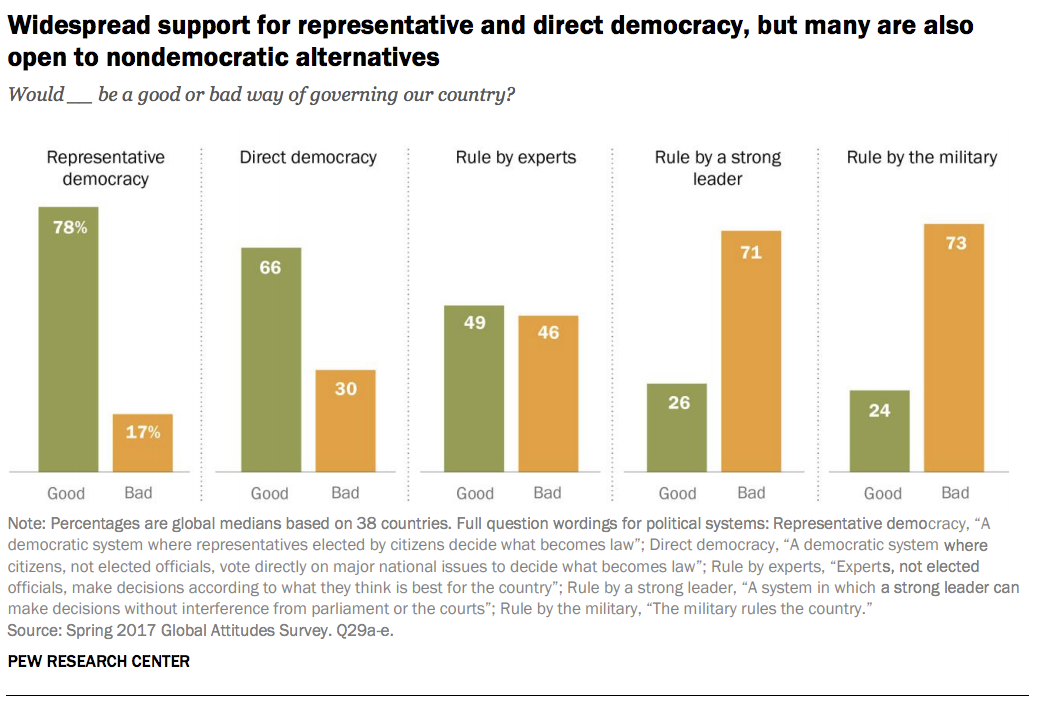
Although there was generally less support for nondemocratic alternatives in relatively wealthy, long-running democracies, notable minorities in these countries were open to nondemocratic approaches. For instance, about a quarter or more back the strong leader model in Japan, Italy, the United Kingdom, Israel, Hungary, South Korea, and the U.S. And while military rule is relatively unpopular, 17% endorse this idea in the established democracies of the U.S., Italy, and France.
The poll also found considerable support for direct democracy. A median of 66% said “a democratic system where citizens, not elected officials, vote directly on major national issues to decide what becomes law” would be a very or somewhat good way to govern their country. Direct democracy is broadly appealing across the diverse mix of nations surveyed (notably support is relatively low in the UK, which was struggling with the aftereffects of the Brexit vote at the time of the poll – 56% of Brits say direct democracy is a good approach).
In many ways, the support for direct democracy reflects a broader interest among citizens in having a more prominent voice in public debates and policymaking. Frustration with the political status quo has created opportunities for anti-establishment parties and leaders in many nations, and often their appeals to the public have featured elements of direct democracy, such as referenda or other forms of public consultation. Direct democracy has been included in the platforms of many populist political parties from the right and the left that have gained support in recent years. In the Pew Research survey, supporters of right-wing populist parties such as UKIP in the UK and Geert Wilders’ Party for Freedom in the Netherlands are more likely to consider direct democracy a good way to govern, as are supporters of Spain’s left-wing Podemos.
People want a more direct voice in policymaking because, in part, they are frustrated with the key institutions of representative democracy, including political parties, as evidenced by electoral upheaval and shifts in party systems across the globe. As traditional parties and establishment political leaders have lost favor, new parties, movements, and leaders have emerged. Italy is now governed by a coalition of two populist parties, the League and the Five-Star Movement. Spain has transitioned from a largely two-party system to one with five major parties. But it’s not just Europe – in Latin America, non-traditional leaders from the right (Bolsonaro in Brazil) and left (López Obrador in Mexico) are now in power. In the U.S., Donald Trump has reshaped the Republican Party and challenged a variety of democratic norms. And these frustrations with traditional parties do not manifest themselves solely on the political right or left, or among movements that are typically thought of as populist. For instance, with his stunning victories in the presidential and parliamentary races of 2017, Emanuele Macron and his En Marche remade France’s party system from the center.
Discontent with the functioning of democracy and dissatisfaction with political elites is driven by a variety of factors. Economic anxiety, cultural conflict, and political dysfunction all play a role in shaping the current moment of unease. On the economic front, the global financial crisis had a strong impact on public attitudes about the economy, and for much of the past decade views about the state of the economy have been grim in many nations. However, in the past couple of years, economic ratings have improved in a number of G20 countries. The share of the public saying the national economic situation is good rose 30 percentage points or more between 2009 (in the depths of the financial crisis) and 2018 in Germany, the U.S., Poland, the UK, and Japan.
Still, citizens in many economically advanced nations express largely negative views about the economic past and the long-term economic future. When asked whether the financial situation for average people in their country is better, worse, or about the same as 20 years ago, 87% of Greeks and 72% of Italians say they are worse off, as do more than half in Spain, France, and the UK. Opinions are even more dour when it comes to the economic prospects for the next generation – across 18 economically advanced nations polled in 2018, a median of 56% said they believe children in their country will be worse off financially than their parents when they grow up; just 34% thought they would be better off.
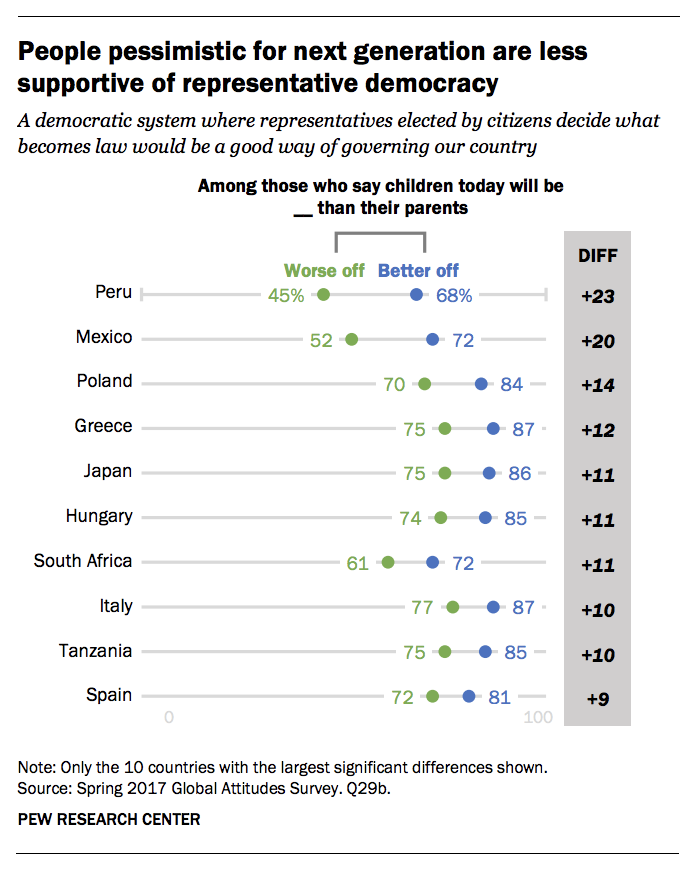
There is also less enthusiasm for representative democracy among people who are pessimistic about the long-term economic future. In 16 of 38 nations polled in 2017, support for representative democracy is lower among those who believe that children growing up in their country will be worse off financially than their parents.
For instance, among Peruvians who think that the next generation will be worse off, just 45 percent say representative democracy is a good thing, compared with 68 percent among those who expect children to be better off than their parents.
Opposition to diversity and pluralism is also linked to a lack of commitment to representative democracy. The 2017 Pew survey asked respondents, “Overall, do you think having people of many different backgrounds, such as different ethnic groups, religions and races, makes our country a better place to live or a worse place to live?” In thirteen nations, people who think diversity makes their country worse are less likely than those who believe it makes their country better to say representative democracy is a good system. The difference is roughly 10 percentage points or greater in Spain, Israel, Mexico, Argentina, Australia, Sweden, Canada, and the United States. In South Africa, a nation with a tragic history of racial oppression and division, 73% of those who see diversity as an asset endorse representative democracy; among those who say diversity makes South Africa worse, just 54% hold this view. Another five nations show a similar, though only marginally significant pattern.
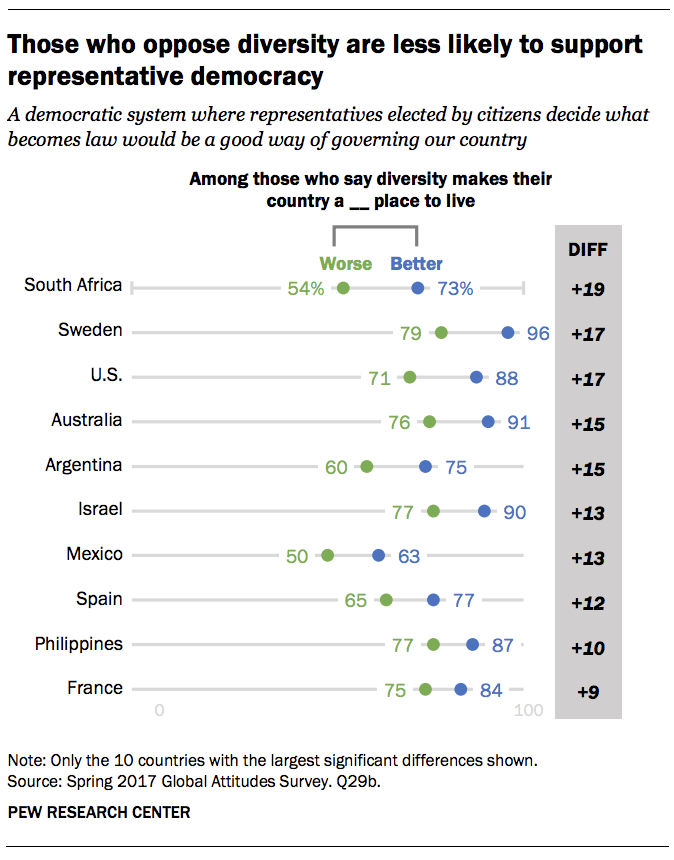
Culture figures prominently in the nostalgic rhetoric common among some contemporary populist movements. In their recent study of nostalgia as a cultural and political force in the United Kingdom, France, and Germany, Sophie Gaston and Sacha Hilhorst wrote that “In these great nations, each with, in historical terms, momentous levels of prosperity, standards of living, and global influence, a substantial minority – or even majority – of citizens are gripped by a kind of malaise, a sense that something is fundamentally rotten at the heart of their societies. Moreover, an omnipresent, menacing feeling of decline; that the very best of their culture and communities has been irreversibly lost, that the nation’s best days have passed, and that the very essence of what it means to be French, or German, or British is under threat.” These types of views are linked to anti-immigrant sentiment – public opinion data make clear that many in Europe have restrictive, exclusionary notions of national identity that could be threatened by the recent wave of immigration. In a 2016 Pew Research survey, majorities in Hungary, Greece, Poland, Italy, Spain, and the United Kingdom said that to be truly Hungarian, Greek, Polish, and so forth, one needs to have been born in the country.
Polling also shows how views about the past can shape attitudes toward democracy. The 2017 global survey found somewhat less enthusiasm for representative democracy among those who feel that people with whom they identify have not made progress in recent decades. In 23 of 38 nations, those who say that life in their country is worse than it was fifty years ago for people like them are less likely to say representative democracy is a good thing. For instance, 83% of Poles who think life is better than it was fifty years ago for people like them believe representative democracy is a good approach; among those who say life is worse, just 62% support this form of government.
The negative reaction to increased immigration has clearly had a cultural component in many nations, and fears about growing diversity and immigration from the Middle East and other regions have helped fuel recent upheavals in European politics. As Ronald Inglehart has recently noted, “The immediate cause of rising support for authoritarian, xenophobic populist movements is a reaction against immigration (and, in the United States, rising racial equality)” (Inglehart 2018). And as Inglehart also notes, “Economic insecurity can exacerbate these cultural pressures toward authoritarianism.”
Recent debates about the relative power of economic and cultural dynamics as drivers of the rise of authoritarian populism may sometimes miss the degree to which these factors interact with, reinforce, and multiply one another. The economics versus culture debate can also lead analysts to overlook the distinctly political challenges driving dissatisfaction with the political status quo. While average citizens tend to believe representative democracy is a good system of government, many are unhappy with the way representation is working, and they are convinced that political elites are out of touch with average citizens. Political efficacy is often quite low, and average citizens do not believe they have the power to influence decisions made by seemingly distant leaders.
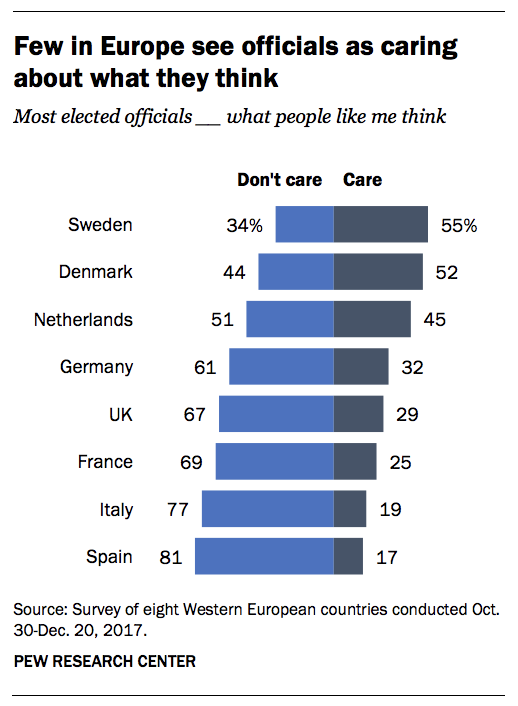
The sense that political elites do not listen to ordinary citizens is a major source of discontent in Europe. A recent survey of eight European countries illustrates how people who feel that politicians do not care what they think and that ordinary citizens could do a better job than elected officials express more negative opinions about economic issues and immigration (Simmons et al. 2018). They also expressed more negative views about a variety of institutions, including parliaments, banks, and the media. Pew polling has also shown that while many Europeans continue to believe the EU stands for lofty goals such as peace, prosperity, and democracy, they also tend to think Brussels is out of touch. Political efficacy is quite low in many nations, and ordinary.
Proposal
Proposal In Europe and other parts of the world, many are displeased with the functioning of their political system, and there is a clear sense that political elites are not responsive to citizens’ needs. To avoid exacerbating this disconnect, the G20 and other major multilateral convenings should work to ensure that the voices of average citizens are incorporated into discussions and deliberations regarding major global challenges. Researchers can make contributions to this end through efforts to better understand public sentiments, as well as efforts to ensure those sentiments are heard by policymakers. They can explore in systematic ways key elements of the international agenda to inform the G20 process and other key global governance institutions. Below are three ideas for potential contributions along these lines.
Understanding the public-elite divide
Researchers could take a useful step in addressing this disconnect between average citizens and elites by conducting more empirical analyses to understand the attitudinal and perceptual gaps between public opinion and elite opinion. Surveying elites often involves a series of conceptual and methodological challenges. Defining who is an elite can be problematic. Even if you define your universe of elites, sample frames for such surveys (such as accurate lists of email addresses) are often difficult to obtain. And even if you have accurate contact information, response rates are often low. Still, polls of elites are possible.
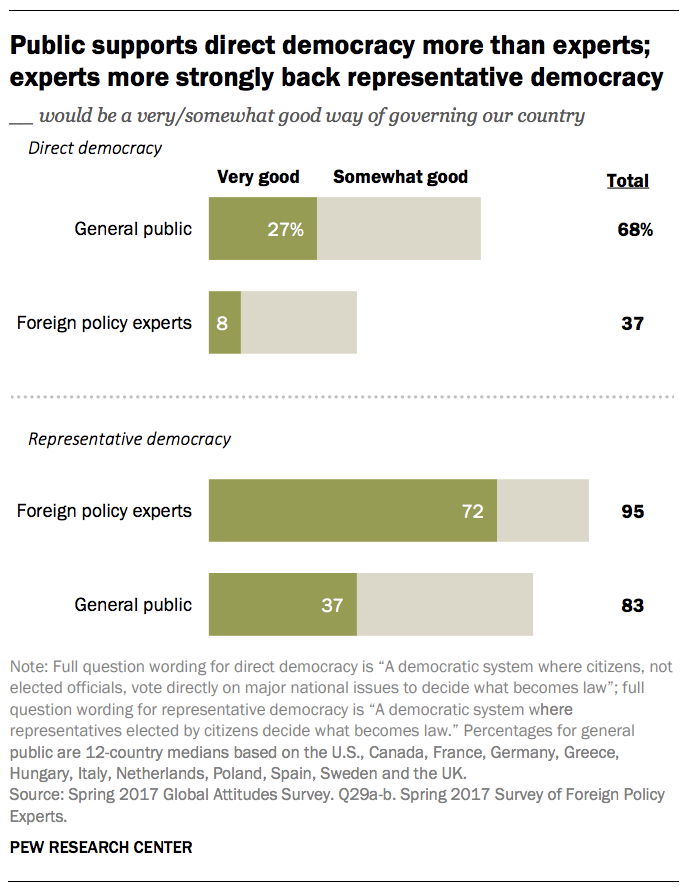
For example, a 2018 Pew study highlighted both similarities and differences in opinions between transatlantic foreign policy experts and general publics in Europe and North America. The experts (who included policymakers, think tank experts, academics, and others) were asked the same set of questions about different types of government that general publics were asked on the 2017 Pew survey. Experts registered even higher levels of support for representative democracy than average citizens had. However, experts were far less likely to embrace direct democracy. Across 12 European and North American publics surveyed by Pew, a median of 68% said direct democracy is a good way to govern. In contrast just 37% of the transatlantic policy elites held that view.
The Teaching, Research, and International Policy (TRIP) surveys of international relations scholars provide another opportunity for comparing elite and public opinion. For example, comparing TRIP data on scholars’ perceptions of major international threats with Pew data on threat perceptions among average citizens yields some interesting differences. The scholars are much more concerned than the general publics about climate change, but much less worried about terrorism (Poushter 2018).
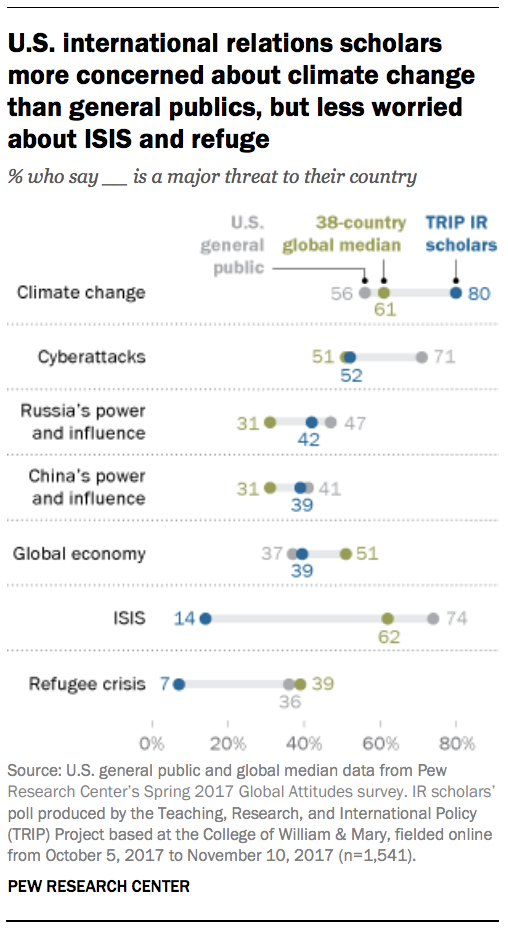
Efforts such as these may help illuminate the disconnect between various types of elites and ordinary citizens. A better understanding of this gap will not necessarily heal the disconnect, but it may provide a first step by identifying where these gaps exist and how wide they have become.
Public opinion and the SDGs
As governments and international organizations work toward achieving the Sustainable Development Goals by 2030, they should also work to understand public opinion on major issues covered by the SDGs. It is highly unlikely that many average citizens around the world know much about the specifics of the SDGs, but they do have opinions about many of the important topics the SDGs are designed to address.
One innovative effort along these lines was the United Nations’ My World surveys. The first My World project, which began during the run-up to the launch of the SDGs in 2015 collected online votes from nearly 10 million people in 194 countries around the world to get input on how to design the goals. More recently, the My World 2030 studies are working to incorporate more rigorous nationally representative sampling designs into the project.
Additionally, the Pew Research Center is working with the United Nations Development Programme (UNDP) to study public opinion around the world on topics related to SDG 16, which will be a major theme of the 2019 UN High-level Political Forum. SDG 16 seeks to “promote peaceful and inclusive societies for sustainable development, provide access to justice for all and build effective, accountable and inclusive institutions at all levels.” This research effort will not entail the collection of new data; instead, it will focus on identifying existing public opinion data that explores public perceptions regarding issues such as inclusivity, accountability, and equal access the justice around the world.
Public opinion and the G20
Each year the G20 host nation focuses on a particular set of issues and tries to build support among the international community for policy initiatives addressing those challenges. Survey research could make some useful contributions by proving data on public opinion around the world on the issue priorities identified by G20 host nations.
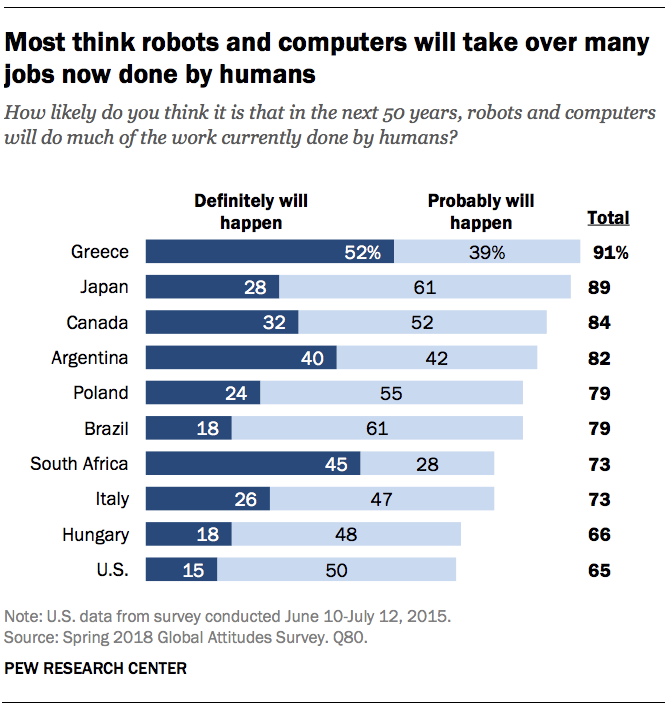
One example was a Pew survey conducted in 10 advanced and emerging economies a few months before the 2018 G20 in Buenos Aires. Argentina made the future of work one of its key issues for the 2018 G20, and the survey explored public concerns about automation and its implications for the economy, as well as views about which institutions should be responsible for ensuring that people are prepared for the jobs of the future. One key finding from the survey was that across all 10 nations, big majorities believe robots and computers will take away jobs currently done by humans.
Conclusion
The political tumult witnessed many nations over the past few years has highlighted a significant gap between citizens and political elites. If governments, international organizations, and multilateral summits are going to successfully address global challenges, and develop policies and initiatives that have credibility with citizens, they will need find ways to listen to the voices of average citizens. There may be many ways to accomplish this, but surveys and other types of research are one established approach for bringing the public’s voice into important debates. G20 stakeholders and leaders in other major multilateral endeavors should try to more systematically incorporate such research into the debates they organize and foster.
REFERENCES
1. Abramowitz, Michael J. and Sarah Repucci, “The Freedom House Survey for 2017: Democracy Beleaguered,” Journal of Democracy 29 (April 2018): 128–42.
2. Economist Intelligence Unit, Democracy Index 2017: Free Speech Under Attack (London: 2018), https://pages.eiu.com/rs/753-RIQ438/images/Democracy_Index_2017.pdf.
3. Foa, Roberto Stefan, and Yascha Mounk, “The Danger of Deconsolidation: The Democratic Disconnect,” Journal of Democracy 27 (July 2016): 5–17.
4. Galston, William, “The Populist Challenge to Liberal Democracy,” Journal of Democracy 29 (April 2018).
5. Gaston, Sophie and Sacha Hilhorst, At Home in One’s Past: Nostalgia as a Cultural and Political Force in Britain, France and Germany (Demos, 2018), www.demos.co.uk/wp-content/uploads/2018/05/At-Home-inOnes-Past-Report.pdf.
6. Inglehart, Ronald, “The Age of Insecurity: Can Democracy Save Itself?” Foreign Affairs 97 (May–June 2018): 20–28.
7. Levitsky, Steven and Daniel Ziblatt, How Democracies Die (New York: Crown, 2018).
8. Mounk, Yascha, The People vs. Democracy: Why Our Freedom Is in Danger and How to Save It (Cambridge: Harvard University Press, 2018).
9. Simmons, Katie, Laura Silver, Courtney Johnson, Kyle Taylor, and Richard Wike, “In Western Europe, Populist Parties Tap Anti-Establishment Frustration but Have Little Appeal Across Ideological Divide,” Pew Research Center, 12 July 2018, www.pewglobal.org/2018/07/12/inwestern-europe-populist-parties-tap-anti-establishment-frustration-buthave-little-appeal-across-ideological-divide.
10. Wike, Richard and Janell Fetterolf, “Liberal Democracy’s Crisis of Confidence,” Journal of Democracy 29 (April 2018): 136-150.
11. Wike, Richard, Laura Silver, and Alexandra Castillo, “Many Across the Globe Are Dissatisfied With How Democracy Is Working,” Pew Research Center, 29 April 2019, https://www.pewglobal.org/2019/04/29/manyacross-the-globe-are-dissatisfied-with-how-democracy-is-working/.
12. Wike, Richard, Katie Simmons, Bruce Stokes and Janell Fetterolf, “Globally, Broad Support for Representative and Direct Democracy,” Pew Research Center, 16 October 2017, https://www.pewglobal.org/2017/10/16/globally-broad-support-forrepresentative-and-direct-democracy/








